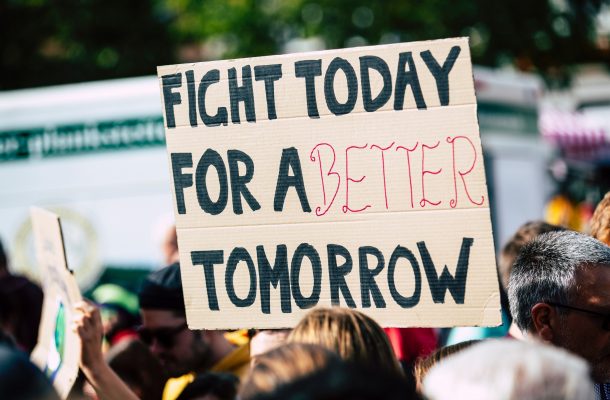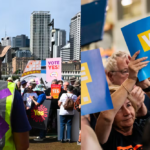Arvanitakis on American politics: Is an inclusive progressive turn possible?

This last fortnight in American politics has continued to surprise and confound commentators while simultaneously ratifying our suspicions. We have seen the Trump Administration have a failed unofficial campaign launch, the Democrats uncertain about where to position themselves on the political spectrum and the reform movement suffering setbacks.
In the last fortnight, three moments are worth noting that seem to highlight just how uncertain things are in this election year.
Trump’s rally fizzles
The first was the less than expected turn out to the Trump campaign rallies in Tulsa, Oklahoma. Originally scheduled for 19 June, or Juneteenth, the President showed a moment of contrition when he decided to move the rally after the significance of the date was pointed out to him.
This is a significant date named for 19 June 1865, when the enslaved in Texas learned from Union soldiers that they were free, more than 2 years after Emancipation Proclamation. In a NPR special report, historians noted that former slaves would use this date to share their experiences with their children and grandchildren as a reminder of where they had come from.
The Trump campaign was keen to start these political rallies because they both enthuse the President and motivate his supporters. A combination of concerns about Covid19 and the fact that many young people used social networking sites to take up the tickets, meant the rally went from ‘huge’ to ‘sad’.
It was not a good look for a President who takes pride in his ability to excite a crowd. Following the rally, what we saw was best described by The Guardian as ‘a walk of shame’ as the President walked off Airforce One looking dejected and deflated.
This is reflective of Trump’s poll numbers which continue to fall amid rising Covid19 cases and divisive rhetoric in light of the Black Lives Matter protests.
With friends like these…
This week, John Bolton, released his book outlining his experience as the former national security advisor for the Trump Administration. The book is a damning critique of the President and his approach to the office.
John Bolton is a known hawk and a favourite of Fox News. The decision to release the book has seen Bolton criticised by both his former right-wing conservative allies and the Democrats because he did not appear at the impeachment. Bolton responded by saying that the impeachment was a politically motivated partisan project that missed the mark.
Given the fact that the impeachment gave Trump a boost in his approval rating and failed to gain broader traction beyond the Democratic base, he seems correct in his critique.
In interviews, Bolton has denied that he would vote for Democratic candidate, Joe Biden, when he said he would not support Trump. Making his position very clear, he said:
“I don’t think he (Trump) should be president. I don’t think he’s fit for office. I don’t think he has the competence to carry out the job… I don’t think he’s a conservative Republican. I’m not going to vote for him in November. I’m certainly not going to vote for Joe Biden either. I’m going to figure out a conservative Republican to write in.”
Democratic Primaries
While all this seems to be working against the Trump Administration, the Democratic establishment has its own challenges. While Biden has the support of the establishment, he has failed to capture the imagination of the more progressive end of the Party.
This has played out in both the New York and Kentucky primaries.
In New York, candidates from the Democratic Party’s left wing have significant leads in three marquee House primaries in a profound show of progressive political power.
The primary in Kentucky was even more insightful. Kentucky Democrats had to decide who would be their nominee against Mitch McConnell, the Senate majority leader. The establishment pick was Amy McGrath, a former Marine pilot who raised well over US$40 million.
McGrath was dominating the primary for months. That was until state Representative, Charles Booker, roared into contention in recent weeks, energised by the Black Lives Matter reform movement. As the New York Times noted:
“…in a race that was testing the power of money against the potency of the grass-roots activism that has sprung up around the Black Lives Matter movement.”
The question is whether these representatives will appeal beyond the Democratic base? The Democratic establishment is unsure and as such, remains caught in a bind.
An inclusive left-wing turn?
The election of Donald Trump, Brexit and a host of other political developments across the globe since 2016 have marked an identifiable political turn to the right. The re-emergence of these mostly right-wing populist movements rode on the back of anti-globalisation sentiment, a political correctness backlash and a sense that the political, economic and cultural elites had lost any connection to the daily challenges of the average person.
An unofficial cultural war was declared, and has seen the dismantling of progressive advances from transgender rights to the winding back of environmental reform and the undermining of the higher education sector. More recently, the moves in Australia to attack humanities-based degrees have been celebrated because they are often criticised as being the home of navel gazing elites.
Such actions are unapologetically divisive.
The recent Black Lives Matters protests have re-sparked progressive reform movements and indicate that a left-wing turn is emerging. The question is, can a progressive movement learn from partisan nature of the right-wing pivot and be more inclusive?
In a powerful New York Times article, former civil rights activists who had marched with Dr Martin Luther King Jnr shared seven lessons and mistakes from their experiences. These include the need to ‘pay attention’ when a police officer chooses to kneel with protestors and to acknowledge that moments of change will not last forever.
Reading this, one theme that emerges in the discussions is that for any meaningful change to last, it must find a way to include those whose politics do not perfectly align. Also, windows for change can close quickly. Just how fleeting the chance for reform became obvious when the Minnesota legislature failed to reach a deal on police reforms. Likewise, at a national level, the moment of reform has failed to gain traction.
The challenge for progressives then, is how to use the moment to overcome partisanship: that is, rather than finding new ways to perpetuate the culture wars, to compromise and bring those uncomfortable with change along with us.
It is a big challenge – and one that I am not sure many want to confront.
Professor James Arvanitakis is the Executive Director of the Australian American Fulbright Commission – one of the world’s most prestigious international education and cultural exchange programs.











